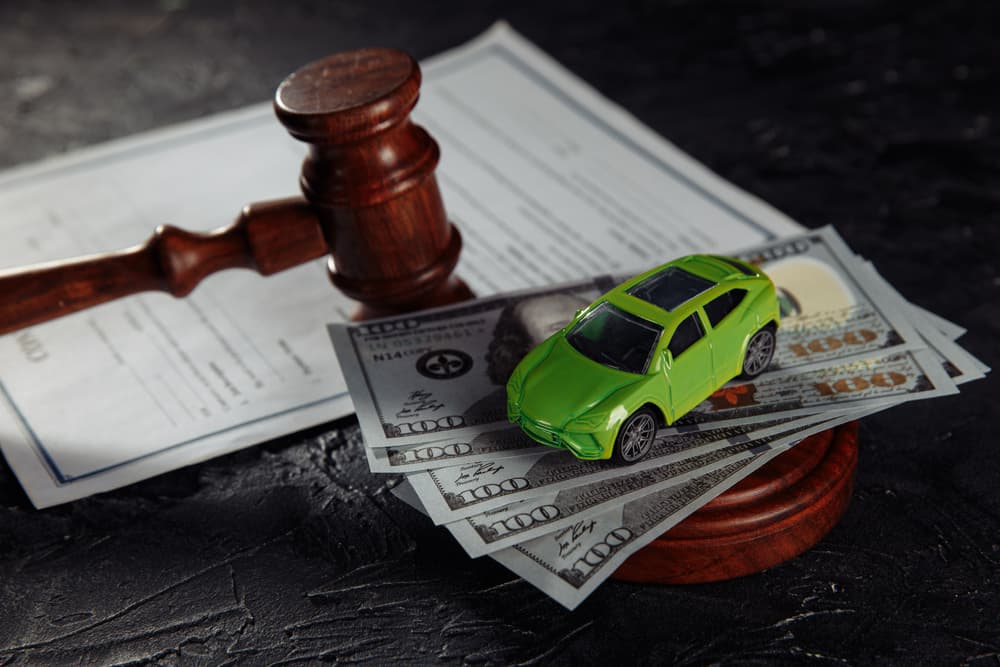Quick Answer
Being in a motorcycle accident is full of ups and downs (yes, we said ups). Of course, the downsides are more immediate—the pain and emotional trauma of being part of such a distressing experience, to name a few. But there is a potential for a positive outcome: the possibility of receiving a payout to compensate for your motorbike accident.
While money can’t repair any residual injuries or your motorcycle, it can help pay off your medical bill, compensate you for the time you couldn’t work, and reimburse the cost of damages caused to your motorcycle.
But what is the average settlement for a motorcycle accident lawsuit?
The average settlement is $73,7001 for individuals who’ve taken their insurance claims to trial. Motorcycle accident settlements typically range between $10,000 to $100,000.
Maximum settlement: $375,000
Minimum settlement: $7,500
Average settlement: $73,700
<Median settlement: $49,000
(Settlement data was derived from 100 settlement amounts for motorcycle accident cases between 2021 and 2024.)
Your insurance company is likely to offer a lot less than that number, but with the right motorcycle accident attorney at your side, you might see a heftier price tag attached to your payout.
How Much Are Most Motorcycle Accident Settlements?
If Oprah doled out motorcycle accident settlements like she handed out cars, this question would have a much more concrete (and uplifting) answer. “You get half a million. You get half a million. Everyone gets half a million dollars!”
Alas, that’s not how the injury claim system works. Instead, every motorcycle accident lawsuit and its eventual settlement is as unique as a fingerprint; its cause and the effects thereafter play a larger role in determining how much your settlement may or may not be.
Some important factors that often impact the settlement amount include:
Who Is at Fault for the Accident?
Foremost, your car insurance company will want to determine who caused the accident. If you (the motorcycle rider) are at fault, then the case is closed before it even opens. Why? Because your insurance company won’t reward a payout to a driver who caused the motorcycle accident injury to happen.
However, if they find that you weren’t at fault, you have a much higher chance of receiving a settlement for the accident claim. According to the National Transportation Safety Board, the odds are ever in your favor. They claim that in 64% of motorcycle crashes that involved more than one vehicle, the other drivers caused the accident.2
It all boils down to whether your accident lawyer can gather nearly indisputable proof that the car accident wasn’t your fault.
What Are the Damages to the Injured Motorcyclist?
As a motorcyclist, you’re probably all too familiar with the exhilarating feeling of the wind blowing through your hair. But because you’re living life to the fullest, you’re also more exposed to the elements. That means if you’re in a motorcycle crash, you’re 10 times more likely to experience a severe injury compared to car passengers.3
Many crash-related injuries to bikers include:4
- Burns
- Road rash
- Broken Bones
- Limb amputations
- Spinal injuries
- Brain injury & trauma
One factor insurance companies will research before deciding a settlement amount are the total “damages” you’ve accrued from your accident, like your medical expenses and lost wages.
Then comes the pot-ay-to and pot-ah-to of it all—deciding how much they should add to your payout due to pain and suffering. Sure, their determination is subjective, as no one can put a price tag on the challenges you’ve gone through, but there are a few factors they look into when assessing your motorcycle accident claim, such as:
- Your inability to enjoy the lifestyle you once had
- Any future suffering that’ll impose on your daily life
- Emotional distress because of the injury
- Your age during the time of the accident
What Is Your Motorcycle Insurance Maximum Payout or Settlement?
When you’re shopping for motorcycle insurance, you probably assume you won’t actually need to use it, let alone make a personal injury claim for the maximum payout on your policy. But when the unexpected occurs, you’re left crossing your fingers and toes hoping you didn’t skimp on the best premium coverage.
Most insurance payouts only reward the maximum liability stated on your insurance coverage, even if the total cost of damage exceeds your coverage amount. So if your policy covers up to $250,000, but your medical bills and lost wages total $350,000, there’s a very high likelihood that they will only offer a $250,000 settlement to the accident victim.
That’s why it’s helpful to have a dependable personal injury lawyer on your side. No, not the ones with those annoying commercial jingles. The ones who care about helping you receive what you’re owed.
What Is the Potential for Jury Bias?
Let’s say you spoke with your lawyer and decided that the insurance company’s settlement is too low. Taking your claim to trial may earn you a higher payout, but you also face another potential obstacle—the jury.
Whether or not it’s morally sound, those 12 strangers on the jury have their own preconceived notions about motorcycles—and the people that ride them. They either like them or they don’t, and sometimes those biases may play a role in their decision-making in a personal injury case.
One way to curb any negatively perceived biases from jury members is by finding an experienced motorcycle accident lawyer that will complete a thorough investigation to find concrete evidence. With evidence in hand, you stand a better chance of persuading even the most biased of jurors in your motorcycle accident lawsuit.
How Long Do Motorcycle Accident Settlements Take?
So, how long does a motorcycle accident lawsuit take? Much like the amount of money you’ll receive, the time it takes to settle also depends on a few aspects. If your claim is straightforward, it may only take a few weeks.
Most settlements occur in the following order:
- Step 1: Hire an attorney. They’ll collect evidence like medical records, police reports, and videos or photos of the accident to use when filing a claim with the insurance company.
- Step 2: File a claim with your insurance company. Once you’ve filed your claim, as nerve-wracking as it can be, your job is to wait for the insurance adjuster to give you their first settlement offer (or to reject your claim).
- Step 3: Receive the insurance company’s settlement offer. Often you can compare the adjuster’s first offer to the first round of a haggling match. They’ll offer you a low number, and your lawyer will counter with a higher number.
- Step 4: Accept or seek greater damages. If you decide to ask for more, your lawyer will craft a professionally written demand letter asking for more money.
- Step 5: Take the claim to trial. Eventually, the adjuster will max out the insurance company’s offer or reject your claim. If you’re still unhappy with the price tag or if the offer is zero, you can take the claim to trial, which will extend the time it takes to receive your settlement. But if your insurance company presents you with an unfair offer (one that doesn’t cover the cost of your medical bills, wages lost, and other damages) you should speak with your lawyer about the possibility of going to trial.
Types of Damages Awarded in Accident Claims
When it comes to payouts, an insurance adjuster’s job may be to look out for the best interest of the insurance company, but it’s your lawyer’s job to discredit those numbers and demand something more substantial. After all, they’re fighting for the compensation you’re owed in multiple areas, including:
Economic damages
Economic damages are easily defined and even more easily calculated. They include the costs associated with the following:
- Medical treatments – From debriding road rash in the ER to undergoing any potential surgeries in the days and months following, they all account for medical costs caused by the accident.
- Loss of wages – If you’re facing a lengthy recovery, it’s essential to take the necessary time to heal with rest or physical therapy. Depending on the severity of your injuries, your physician may not clear you to work for days, weeks, or even months. Receiving a loss of wages allows you to recover a portion of the money you’d normally make during the average workweek.
- Property damage – Property damage compensation allows you to receive an amount that can either repair minor damage or allow you to purchase a completely new bike.
Non-Economic damages
This type of compensation attempts to put a sum on your pain and suffering, something that is impossible to calculate objectively. Although no one can pinpoint each way you’ve suffered mentally and physically, oftentimes insurance companies use a formula to calculate a sum for non-economic damages like:5
- Having permanent physical pain when completing simple everyday tasks
- Suffering from emotional anguish
- No longer being capable of enjoying activities you once loved, like dancing, exercising, or playing sports
Punitive damages
If the at-fault party’s extreme negligence or misconduct caused the accident, the judge may reward you with additional compensation from that person. And while they don’t grant punitive damages often, if they wish to further punish the at-fault party, they’ll charge them with an out-of-pocket sum that’s added to your overall settlement.6
Find A Lawyer You Can Trust To Handle Your Motorcycle Accident Lawsuit
After the dust has settled from an accident, one of the biggest questions we’re asked is, what is the average payout for a motorcycle accident? Since every accident is different, we can’t give you a finite number off the bat.
What Mighty Law can give you is a list of Motorcycle Accident lawyers you can trust to get you the best possible outcome for your case. Head over to Mighty's Motorcycle Accident Attorney Directory to find an attorney in your area today.
Sources
- All Law. Settlement Factors in a Motorcycle Accident Case. https://www.alllaw.com/articles/nolo/auto-accident/settlement-factors-motorcycle-case.html
- NTSB. Safety Report. https://www.ntsb.gov/safety/safety-studies/Documents/SR1801.pdf
- CMAJ. Direct medical costs of motorcycle crashes in Ontario. https://www.cmaj.ca/content/189/46/E1410
- Consumer Notice. Motorcycle Accident Lawsuits. https://www.consumernotice.org/legal/motorcycle-accident-lawsuits/
- Justia. Non-Economic Damages in Personal Injury Cases. https://www.justia.com/injury/negligence-theory/non-economic-damages/
- Lawsuit Info Center. Motorcycle Accident Settlement Guide. https://lawsuitinfocenter.com/car-accident-lawsuits/motorcycle-accident-settlement/
Know Your Claim’s Worth—and Settle It
Serious injury or no injury at all, move your case forward instantly from your phone.
Thank you for submitting your information.

About the author
Luke is a warm-hearted and highly skilled legal operations expert with an impressive 8-year track record in the personal injury field. As the Client Operations Lead at Mighty, he is dedicated to providing exceptional support, transparent communication, and genuine empathy to clients during their challenging journey. His expertise in streamlining processes and implementing cutting-edge technology makes him an indispensable ally for clients, case managers, and attorneys in their pursuit of justice.






